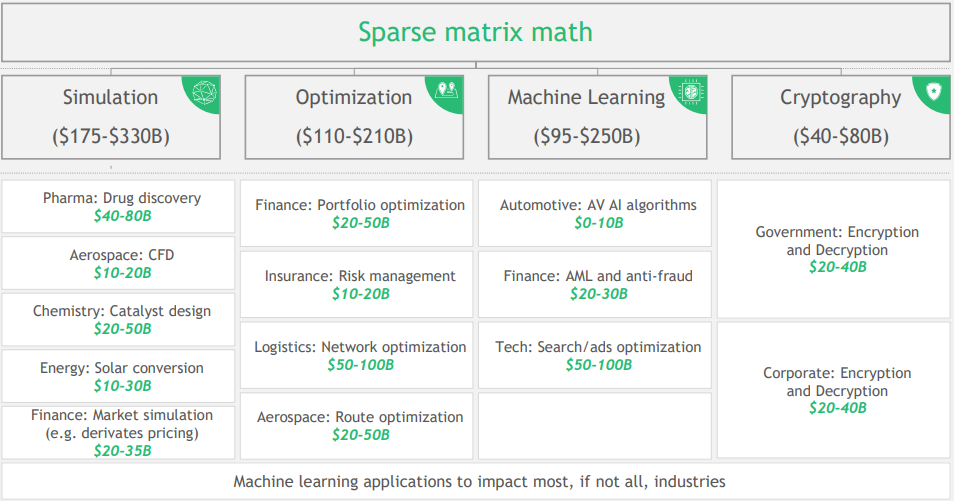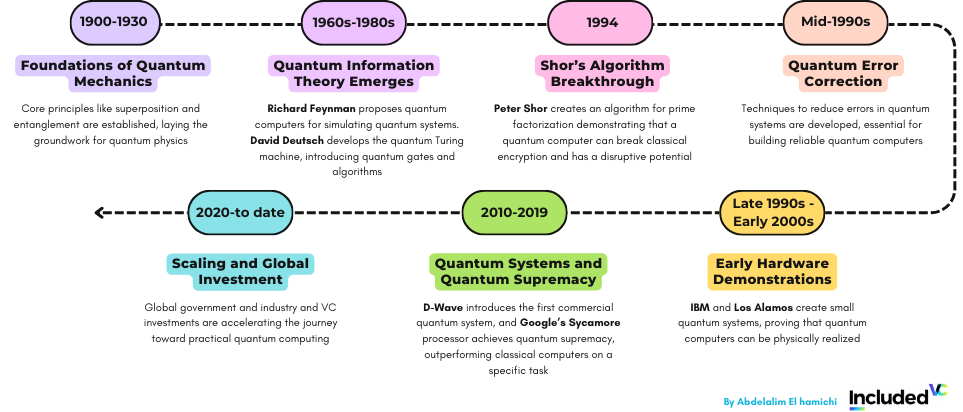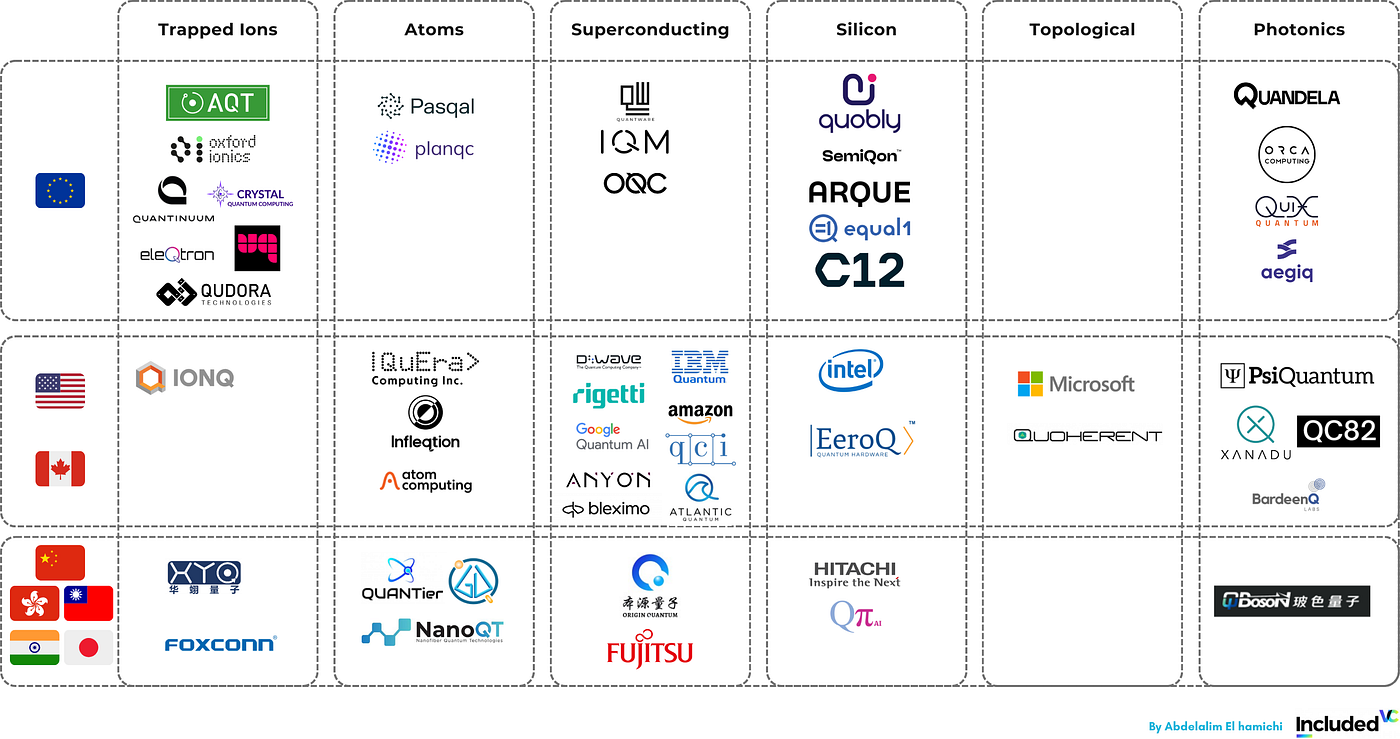
Article source by Abdelalim El hamichi
12 min read – Nov 7, 2024
TL;DR
· The next decade will witness a fundamental shift in how we process information, secure our data, and solve complex problems. The quantum computing revolution isn’t just coming — it’s already begun
· The transformative potential of quantum computing extends into virtually every industry and aspect of modern life, including Healthcare, industrial simulations and Cybersecurity
· Despite remarkable progress, significant challenges remain before quantum computers can reach their full potential
· The race is on…

Coming in this Deepdive…
What is Quantum Computing?
Why is Quantum Computing So Important?
Quantum has been here for a while
Quantum still has a long way to go
The future is Quantum
Final Thoughts
What is Quantum Computing?
You can skip this part if you already know the basics 😊
Let’s start by setting the scene for you. I will keep it very simple, so no thoughts experiments about cats that might or may not be dead and alive at the same time.
What you need to know is that
Traditional computers, from the phone in your pocket (Iphone, Samsung, Xiaomi… your choice) to the most powerful supercomputers (no choice here it is Frontier), operate using classical physics principles. They process information in bits — binary digits that are either 0 or 1, like millions of tiny on/off switches. These bits form the foundation of all classical computing operations, from sending emails to rendering complex 3D graphics.
Quantum computers, however, operate in a fundamentally different way. They use quantum bits, or qubits, which leverage two key quantum mechanical principles:
· Superposition allows a qubit to exist in multiple states simultaneously — not just 0 or 1, but both at the same time, with different probabilities for each state.
· Entanglement, which Einstein famously called “spooky action at a distance,” allows qubits to be correlated in ways that have no classical equivalent, enabling quantum computers to process information in ways that classical computers simply cannot.
Think of it this way: If classical computing is like solving a maze by trying one path at a time, quantum computing is like being able to try all possible paths simultaneously. This parallel processing capability grows exponentially with each additional qubit, leading to computational possibilities that would be impossible with classical computers.
The most fascinating aspect of quantum computing isn’t just its raw processing power — it’s how it processes information. Quantum algorithms don’t just run classical algorithms faster; they approach problems in entirely new ways, opening up possibilities for solving problems that we previously thought were computationally impossible.
Why is Quantum Computing So Important?
Quantum Everywhere
The importance of quantum computing extends far beyond mere technological advancement. It represents a paradigm shift in our ability to solve complex problems that affect virtually every aspect of our lives. Let’s explore some of the most profound ways this technology could reshape our world.
In the realm of drug discovery, pharmaceutical companies currently spend billions of dollars and decades testing millions of molecular combinations to develop new medications. Quantum computers could simulate molecular interactions at the quantum level, potentially reducing this process to months or even weeks. This capability could revolutionize how we develop treatments for diseases like cancer, Alzheimer’s, and rare genetic disorders. Quantum computing could also enable personalized medicine on an unprecedented scale. By analyzing an individual’s entire genome along with vast databases of medical knowledge in seconds, quantum computers could help doctors create truly personalized treatment plans. They could also revolutionize medical imaging, enabling much more detailed scans while reducing exposure to radiation.
Climate change presents another critical application. Current climate models, while sophisticated, are limited by classical computing power in their ability to simulate complex atmospheric interactions. Quantum computers could model climate systems with unprecedented accuracy, helping us better understand and address global warming. They could also optimize carbon capture technologies and accelerate the development of new sustainable materials.
In financial services, quantum computing could transform risk assessment and portfolio optimization. Current models make approximations and use sampling techniques due to computational limitations. Quantum computers could analyze every possible scenario simultaneously, leading to more accurate risk assessments and better investment strategies.
For transportation and logistics, quantum computing could optimize global supply chains in real-time, considering millions of variables simultaneously. This could reduce waste, lower costs, and minimize environmental impact. Urban planning could be transformed through quantum-powered optimization of traffic flows, public transportation, and energy distribution.
Cybersecurity represents both an opportunity and a challenge. While quantum computers could break many current encryption methods, they also enable quantum cryptography — theoretically unbreakable encryption methods based on the laws of physics rather than mathematical complexity.
Perhaps most importantly, quantum computing could revolutionize artificial intelligence and machine learning. Quantum algorithms could process vast amounts of data and recognize patterns that classical computers would never detect, leading to breakthroughs in everything from autonomous vehicles to personalized medicine.
Business Impact
According to an analysis by the Boston Consulting Group, quantum computing has the potential to transform the business landscape, unlocking an estimated $450–850 billion in value by 2040. At its core, quantum computing’s impact comes from its ability to perform “quantum-advantaged” functions, such as sparse matrix math, far faster and more accurately than classical computers. This capability allows quantum computing to tackle complex problems that were previously unsolvable or inefficient to compute. As a result, quantum computing is expected to disrupt a wide range of industries by improving efficiency, speed, and accuracy in four key computational problem areas: simulation, optimization, machine learning, and cryptography.
The first area of impact is simulation, which has a projected economic value of $175–330 billion. Quantum simulations could drive breakthroughs across industries where high-fidelity modeling is critical. In pharmaceuticals, quantum-powered simulations can significantly speed up drug discovery processes, potentially saving years and generating $40–80 billion in value by identifying novel compounds more efficiently. Aerospace also stands to benefit, with computational fluid dynamics (CFD) simulations that can refine aircraft designs and improve fuel efficiency, offering an additional $10–20 billion in value. Similarly, chemistry and energy sectors could see value creation through enhanced catalyst design and more effective solar energy conversion, collectively adding $20–50 billion by improving sustainability and reducing costs.
The second area is optimization, where quantum computing could unlock $110–210 billion by optimizing complex systems on an unprecedented scale. The financial sector could see significant gains in portfolio optimization ($20–50 billion) and risk management ($10–20 billion), with quantum algorithms enabling faster and more accurate assessments of complex market conditions. Logistics is another major beneficiary, with quantum computing facilitating network optimization that could generate $50–100 billion by streamlining supply chains and improving delivery routes. Aerospace stands to gain from route optimization solutions, valued at $20–50 billion, which would improve air traffic efficiency and reduce operational costs.
Machine learning is the third area where quantum computing can have a profound impact, potentially generating $95–250 billion in value. Quantum algorithms can supercharge machine learning models, enabling faster and more effective data analysis. This could prove invaluable for automotive applications like autonomous vehicle (AV) AI, which might improve decision-making accuracy and save up to $10 billion. In finance, anti-money laundering (AML) and fraud detection could see a $20–30 billion boost from quantum-enhanced anomaly detection and pattern recognition capabilities. The technology sector could also benefit significantly, with quantum algorithms improving the targeting and efficiency of search and ad optimization, potentially adding $50–100 billion in value.
The final key area is cryptography, where quantum computing poses both opportunities and challenges, with an estimated value impact of $40–80 billion. As quantum computers become capable of breaking conventional encryption methods, there is an urgent need for quantum-resistant cryptographic techniques to secure sensitive information. Both government and corporate sectors are likely to invest heavily — around $20–40 billion each — in advanced encryption solutions to protect data from emerging quantum threats, ensuring secure communications and transactions.

Overall, quantum computing promises to reshape industries by providing computational capabilities far beyond what is possible today. Its applications in simulation, optimization, machine learning, and cryptography could bring revolutionary advancements in efficiency, innovation, and security. As quantum technology continues to mature, businesses across sectors will likely experience wide-reaching impacts, opening new pathways for growth and value creation
Quantum has been here for a while
What Has Been Achieved So Far?
At its core, quantum computing represents a fundamental departure from all computing systems humanity has built to date. While this technological revolution builds upon decades of classical computing advances, it harnesses an entirely different set of physical principles — the strange and counter intuitive world of quantum mechanics.
Personally, the first time I got to experience the beauty of the Schrodinger Equation in university I knew there will be a time where quantum physics will change our day to day life, but I did not expect it to be this fast. Did you?
The journey of quantum computing from theoretical concept to practical technology spans several decades and represents one of the most remarkable scientific endeavors in human history.
The theoretical foundations were laid in the 1980s when physicists like Richard Feynman and David Deutsch proposed using quantum systems for computation. The field gained momentum in the 1990s when Peter Shor developed his famous algorithm for factoring large numbers — demonstrating that quantum computers could solve certain problems exponentially faster than classical computers.
The first practical steps came in the late 1990s and early 2000s, with researchers creating simple quantum computers of just a few qubits. These early systems proved the concept but were too limited for practical applications.
The past decade has seen remarkable progress. In 2019, Google claimed “quantum supremacy” with its 53-qubit Sycamore processor, performing a specific calculation in 200 seconds that would take a classical supercomputer thousands of years. IBM has been steadily increasing its quantum capabilities, recently unveiling a 127-qubit processor, while companies like IonQ and Rigetti are advancing different approaches to quantum computing architecture.

The Dawn of Quantum Computing
We stand at the threshold of one of the most significant technological revolutions in human history. Quantum computing, once confined to theoretical physics and research laboratories, is rapidly emerging as a transformative force in the business world.
Today’s quantum computing landscape is dominated by several competing qubit technologies, each with distinct advantages and challenges.
- Superconducting qubits, championed by industry leaders IBM and Google, currently lead commercial implementation due to their fast gate operations, though they require extreme cooling.
- Trapped ion qubits, utilized for instance by IonQ and AQT, offer superior coherence times and gate fidelity but operate more slowly.
- Silicon spin qubits, pursued for instance by Intel and Quobly, promise compatibility with existing semiconductor fabrication processes and potentially higher operating temperatures, making them an attractive option for scalable quantum computers.
- Photonic approaches, developed by companies like PsiQuantum and Xanadu, offer room-temperature operation and natural quantum networking capabilities, despite challenges in photon-photon interactions.
- On the cutting edge, some players like Microsoft is exploring topological qubits, which remain theoretical but could potentially offer significantly improved stability.
Each technology represents a different approach to solving the fundamental challenge of creating stable, scalable quantum systems, with the market actively evolving as these various approaches mature and compete for commercial viability.

Quantum still has a long way to go
Challenges to Be Solved in the Next Decade: The NISQ Era and Beyond
We’re entering what experts call the NISQ era — Noisy Intermediate-Scale Quantum computing. During this period, quantum computers won’t be perfect, but they’ll be good enough to solve specific problems that challenge classical computers. This transitional phase is crucial for businesses and professionals. It’s an opportunity to experiment with quantum algorithms, develop use cases, and prepare for the full quantum computing revolution.
The most fundamental challenge is quantum decoherence — the tendency of quantum systems to lose their quantum properties through interaction with the environment. Current quantum computers must be kept at extremely low temperatures and isolated from environmental interference, making them complex and expensive to operate.
Error correction represents another major hurdle. Quantum states are inherently fragile, and errors can creep into calculations. While theoretical frameworks for quantum error correction exist, implementing them requires many physical qubits to create one reliable logical qubit. Achieving fault-tolerant quantum computation remains a key goal.
Scaling up quantum systems presents numerous engineering challenges. Adding more qubits isn’t just a matter of making bigger chips — it requires solving complex problems in materials science, control systems, and quantum architecture. Each additional qubit multiplicatively increases the complexity of the system.
The “quantum software stack” needs significant development. We need better tools for programming quantum computers, simulating quantum algorithms on classical computers, and translating real-world problems into quantum solutions. This includes developing new quantum algorithms, as relatively few problems currently have known quantum advantages.
Manufacturing reliable quantum components at scale remains difficult. Current fabrication techniques need to be refined to produce more consistent qubits with longer coherence times. This challenge is particularly acute for approaches requiring precise atomic-scale manufacturing.
The future is Quantum
Professional Opportunities in the Quantum Age
The quantum revolution isn’t just creating new technologies — it’s creating new careers. As quantum computing matures, we’re seeing increasing demand for professionals who understand both quantum principles and their practical applications. This goes beyond quantum physicists and engineers. We need quantum software developers, quantum system architects, and quantum strategy consultants. Even professionals in non-technical roles need to understand quantum computing’s potential impact on their industries.
The field of quantum computing education is also expanding rapidly. Universities are launching quantum computing programs, and online platforms offer courses ranging from basic quantum mechanics to advanced quantum algorithms. Major tech companies provide cloud-based access to quantum computers, allowing professionals to experiment with real quantum hardware from their desktops.
Preparing for the Quantum Future
For professionals looking to engage with quantum computing, the journey starts with understanding the basics. Quantum mechanics may seem intimidating, but many excellent resources make these concepts accessible to non-physicists. Online platforms like IBM Quantum Experience offer hands-on experience with quantum computers, while quantum programming frameworks like Qiskit provide a practical way to learn quantum software development.
Networking within the quantum computing community is equally important. Professional groups, online forums, and conferences provide opportunities to connect with others in the field, share knowledge, and stay current with rapid developments. Many cities now have quantum computing meetups where professionals can learn from experts and connect with others interested in the technology.
Looking to the Future What Governments, VCs, and Businesses Are Doing to Prepare?
The race for quantum supremacy has sparked a global investment surge across public and private sectors.
While fully fault-tolerant quantum computers may still be years away, the groundwork for quantum-powered industries is being laid today. Organizations that prepare for the quantum future will have a significant advantage over those that wait. This preparation isn’t just about understanding the technology — it’s about imagining new possibilities and being ready to seize them when they arrive.
The quantum computing revolution represents more than just technological advancement. It’s a fundamental shift in how we process information and solve problems. As we stand on the brink of this new era, the question isn’t whether quantum computing will transform our world, but how we’ll adapt and thrive in the quantum age.
Governments worldwide are making substantial commitments. The United States has allocated $1.2 billion through the National Quantum Initiative, while China is reportedly investing $10 billion in a new National Laboratory for Quantum Information Sciences. The European Union’s Quantum Flagship program represents a €1 billion investment, and countries like Australia, Canada, and Israel have launched their own quantum initiatives.

Venture capital investment in quantum computing has skyrocketed. According to PitchBook, VC investment in quantum computing startups exceeded $1.7 billion in 2021 alone. Companies like PsiQuantum, IonQ, and Rigetti have raised hundreds of millions of dollars each, while numerous smaller startups are emerging in quantum software, sensors, and security.
Major technology companies are making significant investments. Google, IBM, Microsoft, and Intel have all established major quantum research programs. Amazon and Microsoft offer quantum computing services through their cloud platforms, while companies like Honeywell have made strategic acquisitions in the quantum space.
Traditional industries are also preparing for the quantum future. Financial institutions like JPMorgan Chase and Goldman Sachs are developing quantum algorithms for portfolio optimization and risk analysis. Pharmaceutical companies including Merck and Biogen are exploring quantum computing for drug discovery. Automotive manufacturers like Volkswagen are investigating quantum solutions for battery development and traffic optimization.
Universities and research institutions are expanding their quantum programs, creating new degrees and research centers. This is crucial for developing the quantum workforce needed to support this growing industry.
Final Thoughts
The quantum computing revolution is no longer a distant prospect — it’s already reshaping the technological landscape. Although many challenges remain before quantum computers reach their full potential, the strides made so far are extraordinary. As we continue to unlock new computational possibilities, quantum technology will redefine industries, create new professional opportunities, and challenge our traditional approach to solving problems. The coming years will be pivotal as we shift into the NISQ era, a transitional phase that demands adaptation, innovation, and preparation. Embracing this technology early could set the foundation for future success, positioning individuals and organizations to thrive in a quantum-powered world.
#QuantumComputing #Technology #Innovation #DigitalTransformation #FutureOfTech #TechTrends #QuantumPhysics #BusinessInnovation


